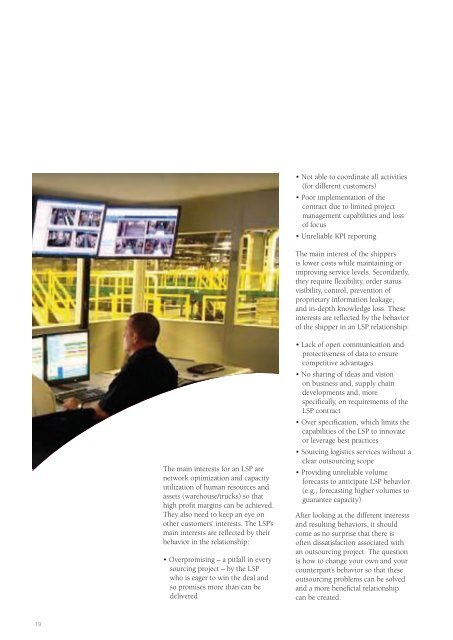Transportation Management Report 2011 - Capgemini
Transportation Management Report 2011 - Capgemini
Transportation Management Report 2011 - Capgemini
Create successful ePaper yourself
Turn your PDF publications into a flip-book with our unique Google optimized e-Paper software.
19<br />
The main interests for an LSP are<br />
network optimization and capacity<br />
utilization of human resources and<br />
assets (warehouse/trucks) so that<br />
high profit margins can be achieved.<br />
They also need to keep an eye on<br />
other customers’ interests. The LSP’s<br />
main interests are reflected by their<br />
behavior in the relationship:<br />
• Overpromising – a pitfall in every<br />
sourcing project – by the LSP<br />
who is eager to win the deal and<br />
so promises more than can be<br />
delivered<br />
• Not able to coordinate all activities<br />
(for different customers)<br />
• Poor implementation of the<br />
contract due to limited project<br />
management capabilities and loss<br />
of focus<br />
• Unreliable KPI reporting<br />
The main interest of the shippers<br />
is lower costs while maintaining or<br />
improving service levels. Secondarily,<br />
they require flexibility, order status<br />
visibility, control, prevention of<br />
proprietary information leakage,<br />
and in-depth knowledge loss. These<br />
interests are reflected by the behavior<br />
of the shipper in an LSP relationship:<br />
• Lack of open communication and<br />
protectiveness of data to ensure<br />
competitive advantages<br />
• No sharing of ideas and vision<br />
on business and, supply chain<br />
developments and, more<br />
specifically, on requirements of the<br />
LSP contract<br />
• Over specification, which limits the<br />
capabilities of the LSP to innovate<br />
or leverage best practices<br />
• Sourcing logistics services without a<br />
clear outsourcing scope<br />
• Providing unreliable volume<br />
forecasts to anticipate LSP behavior<br />
(e.g., forecasting higher volumes to<br />
guarantee capacity)<br />
After looking at the different interests<br />
and resulting behaviors, it should<br />
come as no surprise that there is<br />
often dissatisfaction associated with<br />
an outsourcing project. The question<br />
is how to change your own and your<br />
counterpart’s behavior so that these<br />
outsourcing problems can be solved<br />
and a more beneficial relationship<br />
can be created.















